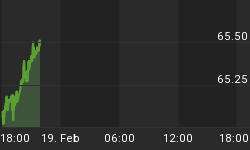"I would also like to note that the same research paper [produced by the Federal Reserve staff] analyzed the macroeconomic effects of the FOMC's full program of securities purchases ["Quantitative Easing," usually called, by non-economists, "printing money"], including the first round of purchases that was initiated in late 2008 and early 2009, the modification of the reinvestment policy that was announced last August, and the second round of purchases that was initiated in November. Those simulation results indicate that by 2012, the full program of securities purchases will have raised private payroll employment by about 3 million jobs. Moreover, the simulations suggest that inflation is currently a percentage point higher than would have been the case if the FOMC had never initiated a securities purchases, implying that, in the absence of such purchases, the economy would now be close to deflation.
- Federal Reserve Vice-Chair Janet L. Yellen; Denver, Colorado; January 8, 2011
"This is a great job, if you like to travel around the country and read speeches written by the staff"
- Federal Reserve Governor Janet L. Yellen, 1997
"Recent data show consumer price inflation continuing to trend downward. For the 12 months ending in November, prices for personal consumption expenditures rose 1.0 percent, and inflation excluding the relatively volatile food and energy components--which tends to be a better gauge of underlying inflation trends--was only 0.8 percent..."
"[I]nflation is likely to be subdued for some time..."
"Very low rates of inflation raise several concerns: First, very low inflation increases the risk that new adverse shocks could push the economy into deflation, that is, a situation involving ongoing declines in prices. [Sic]"
- Chairman Ben S. Bernanke, Testimony before the Committee on the Budget, U.S. Senate, Washington, D.C., January 7, 2011
"From the moment that art ceases to be the nourishment of the best brains, the artist can use all the tricks of the intellectual charlatan. The refined people, the rich ones and the professional layabouts, only want what is sensational or scandalous in modern art. And since the days of cubism I have fed these boys what they wanted and pacified the critics with all the idiotic ideas that went through my head. Whilst I amused myself with all these pranks, I became famous and very rich. I am just a public clown, a fairground barker."
- Pablo Picasso, 1951, attributed. I doubt he said this; but the description fits academic economists, who, unlike the time at which Picasso (may have) spoken, are of another generation, a generation of professional layabouts that is no longer in on the joke. The clowns and barkers spout idiotic ideas because they only think idiotic ideas.
Frederick Sheehan writes a blog at www.aucontrarian.com

















